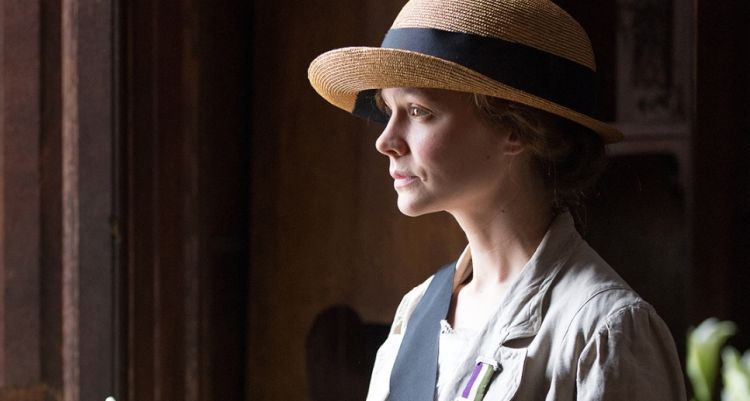 (3.5 / 5)
(3.5 / 5)
As with The Imitation Game, which kicked off last year’s London Film Festival, Suffragette — another period drama — is a quintessential work of British cinema. It too tells an important story.
Instead of the huts of Bletchley Park, we find ourselves at an East End laundry circa 1913, the workplace of Maud Watts (Carey Mulligan) and dozens of other industrious women. From a young age they perform long hours of strenuous, often dangerous, manual labor and receive considerably less pay than their male counterparts.
Maude, however, dutifully accepts her lot in life, content to return home each evening to her young son and gloomy husband Sonny (Ben Whishaw). Almost by chance, she finds herself swept along on the tide of the suffragette movement until, suddenly and violently, the cause is made her own.
Suffragette serves not only as an overview of the fight for female voting rights in Britain, which came about somewhat less than a century ago, but a compelling illustration of a society where those seeking change are too often mocked or scorned. Inspector Steed (a sad-eyed Brendan Gleeson) knows the public shame of dropping off arrestees on their own doorstep can be more effective than a night in the cells.
Maude devastatingly discovers that her job, her marriage, and even motherhood itself are dependent on her compliance with the status quo. Men, as portrayed in Abi Morgan’s no-nonsense screenplay, are best apathetic; at worst, predatory monsters.
As acts of civil disobedience escalate from putting stones through shop windows to out-and-out sabotage, it’s clear that supreme sacrifice is necessary to sway the general public. While it falls to the fair, fanatical Emily Davison (Natalie Press), to become a martyr, Maude is representative of a broader class of woman who underwent cruelty and degradation, all for the sake of something greater.
The plummy, iconic leader of the movement, Emmeline Pankhurst (a cameo-ing Meryl Streep), is an inspiring figure, but she’s gone from the film in a few minutes. It falls to others to put their lives, their freedom, and all they loved on the line.
It’s a shame therefore that Suffragette feels occasionally overly respectable. While their cause is undoubtedly righteous, when Steed talks of a maid almost caught up in an explosion it goes a long way to reminding you that, of their time and place, these women were regarded as terrorists.
Parallel movements are also ignored, like the non-violent suffragists or those who thought only wealthy women should be representation — privileged protester Alice (Romola Garai) may well have been of this persuasion. Seemingly not wanting to muddy the waters, the film seems to have missed an opportunity to present the true scope of those fighting for enfranchisement.
Historical personalities like the sincere but ineffectual David Lloyd George (Adrian Schiller) and committed physician-chemist-cum-explosives expert Edith Ellyn (Helena Bonham Carter) flesh out the supporting cast, but it’s defiant covert Maude who provides the most enduring symbol of the cause. In the face of adversity, agonizing force feedings and merciless police beatings, she finds her voice.
As only the fourth female director to open the Festival — the first since Jane Campion in 2003 — Sarah Gavron herself is somewhat emblematic. It’s hard to imagine more apt a subject to drive this point home. The vote may have been won — and hard-won — but we still have a long way to go.
